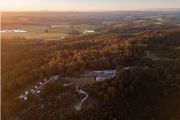
All buzz, no sting: bee hotel is a sweet deal
Sydney’s George Street is buzzing with workers, tourists and parents entertaining their children on school holidays, rushing in and out of shops on a sunny Thursday morning – but not far above is the hum of a different type of busyness.
On level four of Hilton Sydney, above the Zeta Bar terrace and across the street from the iconic Queen Victoria Building, hives of European honey bees have checked in to the high-end hotel.
The bees pay their way by producing about 10 kilograms of honey each week.
Four stacks of hives on the unused rooftop space serve as a base for the bees that speed back and forth between the hotel and Sydney’s Botanic Gardens, a few streets away.
The bees are so busy flying on their highway in the sky, pollinating flowers in the gardens and making honey, that they have never bothered (i.e. stung) the hotel’s other guests.
The Hilton and The Swissôtel around the corner are two of beekeeper Andrew Wilson’s clients who keep hives on their unused roof space in Sydney’s CBD. Lendlease’s Barangaroo tower is also home to bees – and maggots – on its urban “farm”.
Keeping bees on the roof benefits the hotel by supplying enough honey for a commercial kitchen and products to sell or give to guests. But the environmental benefits are critical given bees are facing a global threat.
The Varroa mite, also known as the Varroa destructor, was first detected in hives at the Port of Newcastle north of Sydney in June 2022. The government conducted a 14-month emergency response but found eradication was not achievable.
Native bees are not affected by the mite but it has been attacking the European honey bees for the past three years, and is considered one of the greatest threats to Australia’s honey bee and plant pollination industries.
The European species makes the honey we eat and pollinates most large-scale food crops across the country, which is why it is of great concern.
“It’s super critical to save them for the sake of humanity and our continued existence,” Wilson tells AFR Weekend.
“One in every three bites of food that you take will be as a direct result of honey bee pollination. So there are industries where we simply will not have a crop if honey bees are not available.”
Wilson says the mite is killing hives in trees, which is resulting in agricultural lands not getting the bee density they need to pollinate, particularly on farms along the NSW Central Coast.

Having hives in an urban space such as Sydney’s CBD might not seem like the best location, but Wilson says only a relatively small space is needed to have a big impact.
“Those bees will travel up to eight kilometres to pollinate crops … It’s really great to be able to bring these bees in and provide that pollination to the local area, all while gathering honey for yourself.”
Wilson’s business, Snives Hives, collects unwanted hives from bees that have swarmed in the cavities of homes, offices and schools. He relocates the hives to areas where they are wanted and beekeepers can harvest the honey.
“Getting between 40 and 100 kilograms [of honey] per hive per year is not uncommon.”
Hilton hotel executive chef Hamish Neale says the bees make enough honey for all of the hotel’s food operations and there is enough left over to make products for VIP guests, which include jars with three different flavours of honey – dark chocolate, ginger and raw.
“We are not buying honey that’s packaged in plastic products. We’re not having to get trucks delivering it … If we go through 10 kilos of honey a week, that’s 10 plastic bottles a week. So it’s 520 plastic bottles a year that we’re not using or throwing away or going to landfill.”
Despite being a few metres from one of the hotel’s bars, Neale said there had been no reports of any guests being stung by a bee.
Land tax exemption
AFR Weekend understands some developers are buying land in regional areas and, while waiting for development approvals or undertaking large-scale development in multiple stages, putting hives on the vacant land so they don’t have to pay land tax.
Tax solicitor Matthew Cridland said one of the exemptions available for land tax was through primary production.
“One of the specific items that’s included is the keeping of bees for the production of honey for the purpose of sale,” Cridland told AFR Weekend.
“There are some requirements that need to be satisfied, and those requirements can vary depending on the zoning of the land. So for land that is zoned rural, the only requirement to qualify for the exemption is that the predominant use of the land must be for primary production.
“It’s also necessary to show that the primary production use is of a commercial scale, and that it’s undertaken with a view to making a profit. So there’s a scale requirement that needs to be satisfied.”
Wilson is encouraging anyone with unused or underutilised land, especially those with backyards on a suburban fringe, to consider beekeeping to support primary production industries that need assistance in rejuvenating bee populations.
“There’s a plethora of crops that just simply wouldn’t be around or wouldn’t be viable without bee pollination.”











